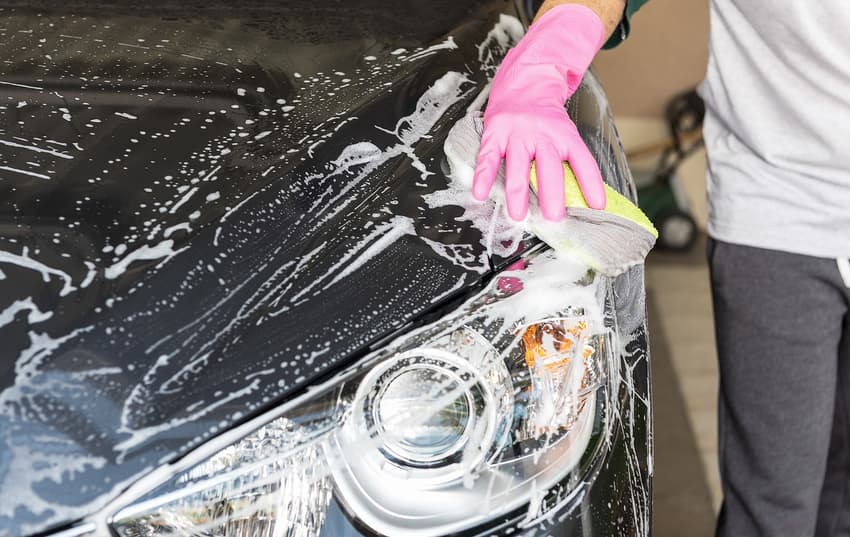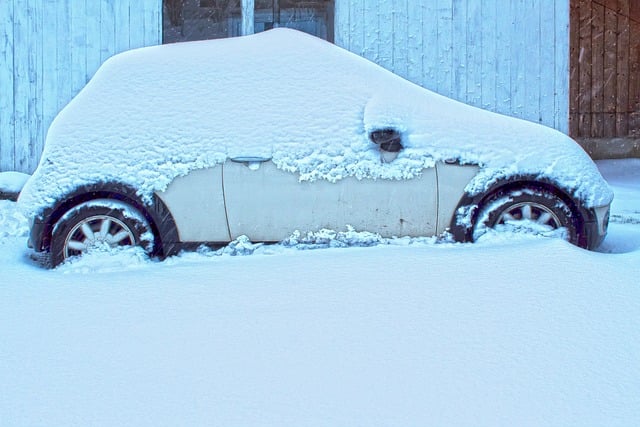READER QUESTION: Can I get fined in Switzerland if my car is dirty?

In a country that is obsessed with cleanliness, most cars are spotless. But can driving in a dirty vehicle get you in trouble? The answer is: it depends.
Generally speaking, you won’t see too many dirty cars on Swiss roads, except perhaps if someone has driven on an unpaved surface (which are a rarity in Switzerland) or in mud, or whose vehicle was a victim of a bird poop attack.
But if that happens, people usually go immediately to a car wash (though never on a Sunday) rather than let others see them driving in a dirty vehicle.
In fact, when the cloud of yellow dust from Sahara covered parts of Switzerland in March 2022, queues to car wash stations were several hundred metres long.
Yes, dirty cars are unsightly on pretty Swiss roads, but is it actually illegal to drive one?
That depends.
If your car’s dirt is is merely a cosmetic eyesore, but not a safety hazard per se, you may get…dirty looks from other drivers, though not necessarily a fine from the police.
However, there are situations when you will definitely be breaking the law if you hit the road in a grimy vehicle.
For instance, if it is snowing heavily and you don’t clear the snow from the windows, the roof, and side mirrors, that is an offence, even though you may argue that snow is not technically ‘dirty’.
Be it as it may, your visibility is impaired, and you are endangering not only yourself but also others.

It's not dirt but it's dangerous. Image by Stefan Schweihofer from Pixabay
The same applies to ice and frost: you must scrape it off completely — and not just the part of the windshield that allows you to see — before driving.
If leaves or twigs fall on the car, they too must be removed, even if they are not on the windshield but on the hood or the roof.
In other words, you can be fined for anything that can potentially keep you from operating your vehicle safely.
Under the Swiss law, windows, windscreens, side windows, and lights must be kept clean at all times. In addition, number plates must be legible, as well.
The penalty for non-compliance depends on the extent of the offence, but can range from just a warning to a several-hundred-franc fine.
If, however, it is determined that your dirty car poses a serious danger to other road users — especially if you cause an accident — you could even face a prison sentence of up to three years.
You can’t really fault the Swiss with being overly cautious in this regard. Many other countries have similar rules in place.
Just 'so'
Other car-related rules, however, seem to be overly fussy.
One of them relates to the ‘CH’ sticker, which indicates the car is Swiss.
READ MORE: Do I need a 'CH sticker' on my car when I leave Switzerland?
You can’t just haphazardly affix the sticker and be done with it — not in Switzerland.
There is a law that regulates this process:
The sticker “must be fixed in such a way as to be clearly legible and as vertical as possible (30° tilt upwards and 15° downwards maximum).
They must be at a distance from the ground of between 0.20 m (lower edge) and 1.50 m (upper edge), provided that there are no technical reasons or requirements of use against this. The rear control plate must be legible in the longitudinal axis of the vehicle, and on each side of it, at an angle of 30°”
And here are some other driving rules you should know:
No hose pipes in the boot: The little-known Swiss driving rules you must know
Comments
See Also
Generally speaking, you won’t see too many dirty cars on Swiss roads, except perhaps if someone has driven on an unpaved surface (which are a rarity in Switzerland) or in mud, or whose vehicle was a victim of a bird poop attack.
But if that happens, people usually go immediately to a car wash (though never on a Sunday) rather than let others see them driving in a dirty vehicle.
In fact, when the cloud of yellow dust from Sahara covered parts of Switzerland in March 2022, queues to car wash stations were several hundred metres long.
Yes, dirty cars are unsightly on pretty Swiss roads, but is it actually illegal to drive one?
That depends.
If your car’s dirt is is merely a cosmetic eyesore, but not a safety hazard per se, you may get…dirty looks from other drivers, though not necessarily a fine from the police.
However, there are situations when you will definitely be breaking the law if you hit the road in a grimy vehicle.
For instance, if it is snowing heavily and you don’t clear the snow from the windows, the roof, and side mirrors, that is an offence, even though you may argue that snow is not technically ‘dirty’.
Be it as it may, your visibility is impaired, and you are endangering not only yourself but also others.

It's not dirt but it's dangerous. Image by Stefan Schweihofer from Pixabay
The same applies to ice and frost: you must scrape it off completely — and not just the part of the windshield that allows you to see — before driving.
If leaves or twigs fall on the car, they too must be removed, even if they are not on the windshield but on the hood or the roof.
In other words, you can be fined for anything that can potentially keep you from operating your vehicle safely.
Under the Swiss law, windows, windscreens, side windows, and lights must be kept clean at all times. In addition, number plates must be legible, as well.
The penalty for non-compliance depends on the extent of the offence, but can range from just a warning to a several-hundred-franc fine.
If, however, it is determined that your dirty car poses a serious danger to other road users — especially if you cause an accident — you could even face a prison sentence of up to three years.
You can’t really fault the Swiss with being overly cautious in this regard. Many other countries have similar rules in place.
Just 'so'
Other car-related rules, however, seem to be overly fussy.
One of them relates to the ‘CH’ sticker, which indicates the car is Swiss.
READ MORE: Do I need a 'CH sticker' on my car when I leave Switzerland?
You can’t just haphazardly affix the sticker and be done with it — not in Switzerland.
There is a law that regulates this process:
The sticker “must be fixed in such a way as to be clearly legible and as vertical as possible (30° tilt upwards and 15° downwards maximum).
They must be at a distance from the ground of between 0.20 m (lower edge) and 1.50 m (upper edge), provided that there are no technical reasons or requirements of use against this. The rear control plate must be legible in the longitudinal axis of the vehicle, and on each side of it, at an angle of 30°”
And here are some other driving rules you should know:
No hose pipes in the boot: The little-known Swiss driving rules you must know
Join the conversation in our comments section below. Share your own views and experience and if you have a question or suggestion for our journalists then email us at [email protected].
Please keep comments civil, constructive and on topic – and make sure to read our terms of use before getting involved.
Please log in here to leave a comment.